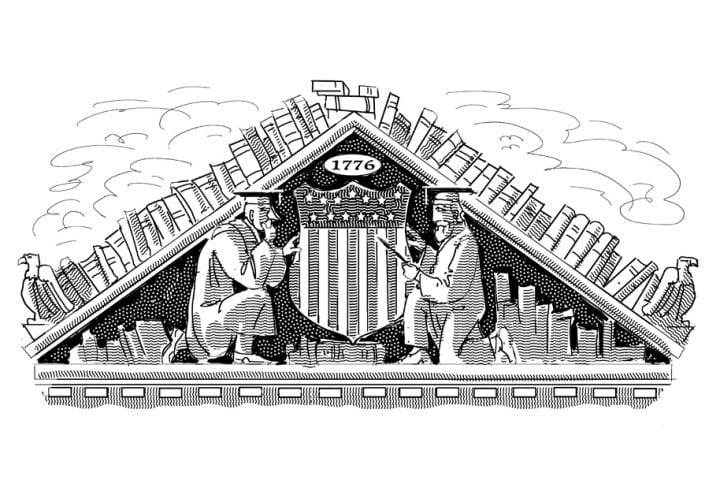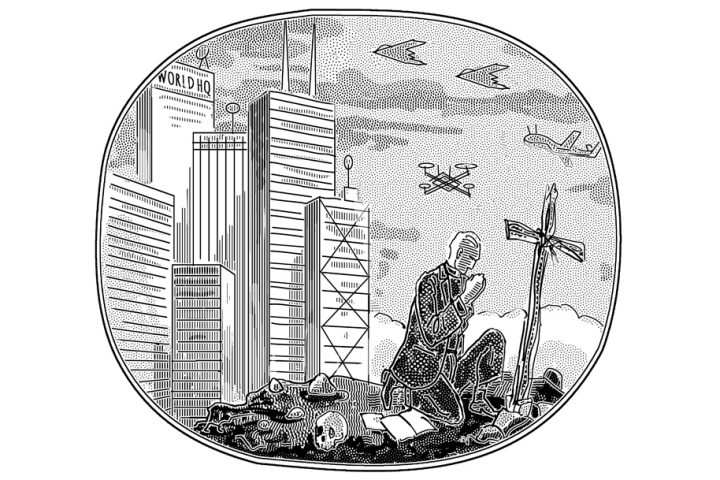Books Reviewed
Can a people dispossessed of the virtues and the talents they impart remain long self-governing?” asks Mary Beth McConahey. If the title of her book, The City and Sex, brings to mind the HBO series Sex and the City, or even Leo Strauss’s The City and Man (1964)…well, it’s supposed to. It may also, by design, remind readers of a certain vintage of House Ways and Means Committee chairman Wilbur Mills, who was one of Washington’s most powerful politicians before he pursued exotic dancer Fanne Foxe (the “Argentine Firecracker”) into the Jefferson Memorial’s Tidal Basin in 1974. He became one of D.C.’s biggest laughingstocks afterwards.
Enjoy the wordplay of this book’s title, but it’s the subtitle, Private Vice and Public Scandal in the American Republic, that describes its thesis and alerts us to what’s at stake. McConahey, who manages Saint Vincent College’s Center for Political and Economic Thought, grounds a deeply serious concern for the republic in the works of the “ancients” (especially Aristotle), the “moderns” (notably Strauss), and the “Americans” (including Benjamin Franklin, James Madison, and Alexander Hamilton). Her question about virtue’s relationship to governance is more than theoretical, and her answer is, emphatically, “No!” Virtue and liberty “are related in a meaningful way,” she argues, which means “that a decline in the former may result in the death of the latter.” McConahey sees this mortal danger in the United States today, where sex scandals involving political leaders are increasingly—and, in her view, dangerously—dismissed as irrelevant to those leaders’ ability to perform their public duties well.
* * *
Who regards scandal so casually? Three important sets of political actors, according to McConahey: the offending politicians themselves, the media, and the citizenry. Her treatment of politicians is especially persuasive. Starting “in the 1970s,” she argues, “offenders began openly asking their constituents to acknowledge their ‘private’ sins as truly and only private and to evaluate them based solely on their ‘official’ job performance.”
Maybe, she suggests, that was a roughly reasonable approach at one time. As shown in her original and thorough canvas of the historical record, in the 111 years between the ratification of the Constitution and the end of the 19th century, only 13 “national-level public officers”—that is, members of Congress, department heads, and presidential candidates—were involved in sex scandals. Just two of them were found to have used their offices to commit graft or other “unsavory official practices.” That’s not altogether surprising, she argues: “the behaviors that prompted [the sex] scandals really weren’t so terrible” in this era. Think Andrew Jackson: he wed a woman whose divorce from her first husband was not yet official, something neither Andrew nor Rachel Jackson knew at the time. Grover Cleveland allegedly fathered a child out of wedlock long before seeking the presidency, but assumed financial responsibility for raising him.
Things got worse in the 20th century. By McConahey’s count, the sex scandals of 53 national public officers came to light in this era. It appears that 44 of these occurred starting in or after 1974—just when, in her account, politicians began telling voters that scandalous sexual conduct is irrelevant.
The 20th-century scandals also were baser than their predecessors, according to The City and Sex’s “degeneracy points system.” The term is inspired, and the system is useful. For example, the “rape of a non-child” garners four points, but “scandalous actions involv[ing] his or her professional subordinates” merits only one. And 20th-century sex scandals more frequently featured abuses of official power. Fully 30% of the guilty parties in these scandals were grafters as well. Among presidents, Warren G. Harding and John F. Kennedy led the league for depraved sexual behavior, each scoring 15 points on McConahey’s degeneracy index. Then came Bill Clinton, whose degeneracy score of 22 points is first-ballot hall-of-shame material.
No serious allegations of sexual misconduct have attended 21st-century presidents George W. Bush and Barack Obama, but the overall pace of scandal has continued to accelerate: 37, by McConahey’s count, in the century’s first 14 years, with more than a fourth of the offenders implicated in graft as well. Do the names Mark Foley, Newt Gingrich, John Edwards, Larry Craig, David Vitter, Herman Cain, and Anthony Weiner ring a bell? Google any that don’t, and you’ll see why they made her list.
* * *
McConahey is rightly alarmed by the particularly craven behavior of contemporary politicians. “Every few months, it seems, a political figure struggles through a sex scandal, fitting perfectly into what has become a sadly familiar pattern.” First come the emphatic denials, like Bill Clinton’s about Monica Lewinsky. Then “he asks publicly for God’s pardon.” Finally, he (and all but a handful have been he’s) “expresses regret to his humiliated spouse and/or family—who are blameless and will stand by him unselfishly—before he apologizes obliquely to anyone he has disappointed or offended with his behavior.”
So much for the politicians—and for the notion that private morality has nothing to do with public morality. What about the media, second on her list of those who discount the importance of sexual scandal? Here McConahey is more equivocal. She identifies the 40 years from Harding to Kennedy as the nadir of American political journalism. Harding’s “amorous activities seem to have wholly consumed him, leaving [the president] distracted to the level of impairment” as “the thieving scoundrels with whom he surrounded himself…carried out one large-scale corruption after the next right under his nose.” Kennedy’s sex-crazed “carelessness constituted a clear dereliction of duty. His allegedly ‘private’ life…left him wide open to blackmail” and required “public funds, buildings, and employees to facilitate and cover up his activities.” In both cases, “paternalistic” reporters knew much of what was going on behind closed White House doors, but kept that knowledge to themselves, a practice that “frustrates civic vigilance and confuses public opinion.” In doing so, they appointed themselves the arbiters of what mere citizens needed and deserved to learn about their elected officials.
Watergate “spawned an entirely new breed of American journalist,” McConahey writes. Troubled, even embarrassed, by the cozy relationships with politicians that had caused their predecessors to pull so many punches, reporters began to draw back the curtain on misconduct, including scandalous sexual behavior. Their motives for doing so may have been prurient, iconoclastic, or even anarchic, but the results often revealed serious corruption, making the revelations’ consequences for the public, on balance, good.
Less good, in her view, is the media’s strengthening conviction that private morality inhabits a separate domain from public morality and that the two can, therefore, be “compartmentalized” by political leaders so that one has no bearing on the other. As McConahey observes, when a sex scandal is unmasked by reporters, modern “[m]embers of the commentariat” typically argue that “a public official’s ability to remain faithful to his wife and/or not engage in taboo sexual behaviors has nothing to do with his competence in office.” The old media turned a blind eye to scandals because revealing them would have been so damaging. The new media reveal scandals and then tell us they’re trivial.
* * *
In the end, McConahey’s concern for the republic’s future hinges less on politicians’ actions and journalists’ decisions than on citizens’ judgments. Actually, concern is too weak a word. What she offers is something approaching panic. “[T]he flame of virtue flickers” is one typical alarum, and “it is virtue that makes all the difference between liberty and slavery in America.” She indicts the American public as “a feeble and dependent one unable to discern right from wrong and no longer possessing the skills of active citizenship.”
According to McConahey, the people’s insistence on rectitude is not just weak but declining. “Hamilton and other early public officials involved in sex scandals were mostly held to account,” she observes. Throughout much of the 20th century, “Americans still mostly acknowledged the importance of virtue, agreed on moral questions, and though evidence of grave sexual misconduct by public officers never really came to light, it is reasonable to assume that perpetrators would have been held to account by a predominantly indignant and unforgiving American public.” But “since the 1970s, politicians involved in sex scandals seem only to suffer electoral repercussions if their scandalous behavior is criminal or truly cruel.”
Really? If McConahey is right, then the past four decades should offer many examples of politicians whose careers survived sex scandals. That does not appear to be the case, which vindicates her countrymen more than her thesis. In The City and Sex’s list of 60 prominent politicians whose scandalous behavior was revealed between 1974 and 2015, 48 were either rejected by the voters or withdrew from campaigns in order to avoid certain electoral defeat. And at least two of those who survived in the short term—Senator David Vitter of Louisiana, who was reelected in 2010, three years after admitting he patronized prostitutes; and Clinton, who finished out his second term—have discovered that sex scandals never really go away. Vitter’s 2015 campaign for governor foundered on revived public revulsion at his being a customer of the “D.C. Madam.” Clinton became an issue in this year’s presidential election when Hillary Clinton charged that Donald Trump had “demonstrated a penchant for sexism.” He replied by describing her husband as “one of the great woman abusers of all time.” Mrs. Clinton has not raised the issue again.
* * *
But even if The City and Sex overstates its case, that case is a very good one. Mary Beth McConahey’s census of scandals over the course of American history provides evidence that politicians do seem to be getting worse. And the commentariat—not just in the media but also in academia—clearly has become more willing to define personal morality as irrelevant to performance in public office. The American people remain more vigilant than she gives them credit for—if they ever cease to be, her jeremiad may someday be regarded as prophetic.



